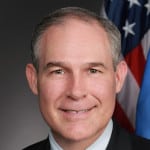As House Republicans issued a bill to dismantle the U.S. Environmental Protection Agency (EPA) this week, a House committee held a hearing on how to make the agency “great again,” and former EPA employees expressed serious concerns about the looming nomination of Scott Pruitt to head the agency.
The bill (H.R. 861), which seeks to “terminate” the EPA by the end of 2018, was introduced on February 3 by Reps. Matt Gaetz (R-Fla.), Thomas Massie (R-Ky.), Steven Palazzo (R-Miss.), and Barry Loudermilk (R-Ga.). In introducing the bill, Rep. Gaetz said: “[The EPA has] exceeded their original mission substantially under both Republican and Democratic presidents and violated the sovereignty of the states.”
While details about the bill weren’t readily available, Gaetz said it seeks to leave it to “states and local governments to protect their environmental assets in the absence of federal overreach.”
The measure drew the ire of environmental groups. Sierra Club Legislative Director Melinda Pierce said in a statement that it reveals Republicans’ “true agenda,” adding, “After decades of trying smoke and mirror tactics to break the EPA, this bill finally makes things explicit and puts them in the clear light of day.”
The bill has been referred to the House Committee on Science, Space, and Technology.
House Committee Holds Hearing on “Making EPA Great Again”
On February 7, meanwhile, the House Committee on Science, Space, and Technology heard testimony from lawyers and representatives from science and technology groups on how the agency evaluates and uses science in its regulatory decision-making process.
Observers noted that the hearing could serve to revive The Secret Science Reform Act, a bill proposed two years ago by Committee Chairman Rep. Lamar Smith (R-Texas), which prohibits the EPA from proposing or finalizing rules based on science that is not transparent or reproducible. The bill won House approval but was stalled in the Senate Committee on Environment and Public Works (EPW).
“Unfortunately, over the last eight years, the EPA has pursued a political agenda, not a scientific one,” Lamar said on February 7.
Smith charged the EPA with proposing rules that are costly to “American families” and have no significant impact on the environment. In his opening statement, he said the Clean Power Plan “set impossible targets for carbon emissions.” He added: “Yet even EPA data shows that this regulation would only eliminate a miniscule [sic] amount of global carbon emissions and would reduce sea level rise by only 1/100th of an inch.”
The new administration has the opportunity to let “technology and innovation protect our environment without government mandates that impose costly and unnecessary regulations on the American people,” he said.
One witness, Jeff Holmstead, a partner for law firm Bracewell LLP, told lawmakers that the hearing was timely because it allowed for “refining the mission of EPA as it seeks to strike the right balance between the costs and benefits of environmental regulations.” He asserted that it was possible to have environmental protection “at a much lower cost than we have today.”
Holmstead backed The Secret Science Reform Act, saying it could make “important and meaningful reforms.” Other measures that he said could increase the likelihood that the EPA’s regulatory decisions would be based on the best data include the Science Advisory Board Reform Act, another bill that the House passed in 2015 but also died in the Senate EPW Committee. The bill essentially changes the rules around how the EPA constitutes its Science Advisory Board. The EPA’s Integrated Risk Information System (IRIS) program, which is located within the EPA’s National Center for Environmental Assessment and serves to develop information about toxicity independently from the EPA’s regional offices, should also be scrutinized, Holmstead said.
Dr. Rush Holt, CEO of the American Association for the Advancement of Science and executive publisher of Science urged caution in “setting laws that would make science a combat zone.” He told lawmakers: “Legislation removing concepts like reproducibility and independent analysis from the hands of scientists and into a legislative chamber or a court room would truly have a chilling effect on the scientific process and reduce the benefits that science could bring to society.
“Seeking to influence the scientific process has no place in how a government or other entity should conduct science.”
Former EPA Employees Rail Against Pruitt Nomination
On February 6, 447 former employees of the embattled agency expressed concerns about the Trump administration’s pick of Oklahoma Attorney General Scott Pruitt to serve as the EPA’s next head.
Republicans on the Senate environment committee approved Pruitt’s nomination on February 2 despite a boycott by Democrats, suspending a rule that required two members of the minority party be present for the vote. The full Republican-dominated Senate is expected to confirm Pruitt’s nomination, though a date has not yet been set for a vote.
Pruitt’s nomination has been fiercely opposed by environmental groups, which claim the attorney general is a climate denier and has corporate ties with the energy industry. On February 7, media watchdog group the Center for Media and Democracy filed a lawsuit to force Pruitt to respond to nine open-records requests filed nearly two years ago for more than 3,000 emails between his office and energy companies. The group also called on the court to block destruction of those emails.
In their letter sent by fax to U.S. Senators, the former EPA employees noted the same concerns. “Mr. Pruitt’s record raises serious questions about whose interests he has served to date and whether he agrees with the longstanding tenets of U.S. environmental law,” they said.
“Our perspective is not partisan,” the letter states. “The American people have been served by EPA Administrators, Republicans and Democrats, who have embraced their responsibility to protect public health and the environment. Different administrators have come to different conclusions about how best to apply the law in view of the science, and many of their decisions have been challenged in court, sometimes successfully, for either going too far or not far enough. But in the large majority of cases it was evident to us that they put the public’s welfare ahead of private interests.”
Pruitt has been reluctant to “accept and act on the strong scientific consensus on climate change,” the letter claims. As Oklahoma’s top law enforcement officer, Pruitt also issued more than 50 press releases “celebrating” lawsuits to overturn EPA actions to ensure cleaner air, cleaner water, and control greenhouse gas emissions, it says. “In contrast, none of Mr. Pruitt’s many press releases refer to any action he has taken to enforce environmental laws or to actually reduce pollution.
“This track record likely reflects his disturbing decision to close the environmental enforcement unit in his office while establishing a new litigation team to challenge EPA and other federal agencies.”
—Sonal Patel, associate editor (@POWERmagazine, @sonalcpatel)










